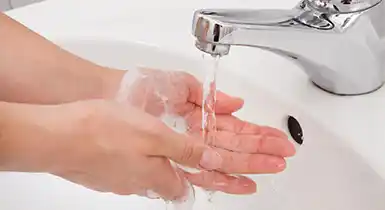October 15, is Global Handwashing Day, a global initiative dedicated to increase awareness and creating an understanding about the importance of handwashing. This year’s theme is ‘Our Hands, Our Future’; reminding us that handwashing protects our own health, but also allows us to build our own futures, as well as those of our communities, and the world.
Handwashing is one of the best ways to protect yourself and your family from getting sick. Washing your hands is easy, and it’s one of the most effective ways to prevent the spread of germs. Clean hands can stop germs from spreading from one person to another and throughout an entire community.
Importance of handwashing with soap is extremely effective and can prevent Diarrhoea and Acute respiratory infections. Handwashing should turn into habit. Handwashing is usually integrated together with other sanitation interventions as part of water, sanitation and hygiene WASH programmes.
As part of good hygiene maintenance handwashing is main criteria.
How can you keep your hands clean?
- Washing hands
Scrub your hands for at least 20 seconds.
- Hand sanitizer
If soap and water are not available, use an alcohol-based hand sanitizer that contains at least 60% alcohol.
When should you wash your hands?
Here are some instances that you should wash your hands.
- Before, during, and after preparing food
- Before eating food
- Before and after caring for someone who is sick
- Before and after treating a cut or wound
- After using the toilet
- After changing diapers or cleaning up a child who has used the toilet
- After blowing your nose, coughing, or sneezing
- After touching an animal, animal feed, or animal waste
- After touching garbage
What are the right steps to wash your hands?
Here are the five steps to ensure that you wash your hands correctly
- Wet your hands with clean, running water (warm or cold), turn off the tap, and apply soap.
- Lather your hands by rubbing them together with the soap. Be sure to lather the backs of your hands, between your fingers, and under your nails.
- Scrub your hands for at least 20 seconds.
- Rinse your hands well under clean, running water.
- Dry your hands using a clean towel or air dry them.
How and when should you use a sanitiser?
- Washing hands with soap and water is the best way to get rid of germs in most situations.
- However, if soap and water are not available, use an alcohol-based hand sanitizer that contains at least 60% alcohol.
- Alcohol-based hand sanitizers can quickly reduce the number of germs on hands in some situations, but sanitizers do NOT get rid of all types of germs.
- Hand sanitizers may not be as effective when hands are visibly dirty or greasy.
- Be cautious when using hand sanitizers around children; swallowing alcohol-based hand sanitizers can cause alcohol poisoning if a person swallows more than a couple mouthfuls.
How do you use hand sanitizers?
- Apply the gel to the palm of one hand (read the label to learn the correct amount).
- Rub your hands together.
- Rub the gel over all surfaces of your hands and fingers until your hands are dry
Teaching children importance of handwashing:
“Washing Hands Is the First Line of Defence against Germs”
When kids come in contact with germs, they can easily get sick if they touch their eyes, nose, or mouth. Once a child gets infected it is just a matter of time before the whole family gets infected. And to avoid this, inculcating the habit of hand washing is can prevent many diseases from common cold to serious infections like flu, hepatitis, and diarrhoea.
Germs mainly spread through:
- touching dirty hands or surfaces
- through contaminated food and water
- through being in contact with someone who has an infection
- through contact with a sick person’s bodily fluids
Some tips to help children hygiene and importance of handwashing:
- Lead and be a role model: Make sure that you are washing your hands thoroughly after coming out of the washroom, before and after finishing your meals this will demonstrate to the child the importance and he will follow.
- Let it be a fun activity
- Make it an attractive experience using colourful soaps, towels etc.
- Make it convenient and comfortable experience in terms of accessibility and soap, reaching sink etc.
- Sing a clean-up song.
- Make it a routine like it should be done before mealtimes
- Make it authoritative
- Demonstrate them the important things like closing the tap after washing the hands or not trying to see how the soap tastes creative.
- Use interactive media to make your child understand the basics and importance of hand washing
- Introduce them to sanitizers and how to use them
- Do Not Scare Your Child With Germs and be patient
About Wockhardt Hospitals
A 50-year-old legacy and tradition of caring is what Wockhardt Hospital stands on. Wockhardt Hospitals has been proactive in bringing innovative nurturing for better health. Wockhardt Hospitals has become a leading health service provider with its strong presence in the western parts of the country i.e. Mumbai, Nagpur Rajkot, Nasik and Surat. This group of 8 hospitals fulfils the need of the community in its chosen field of super specialty like Cardiology, Orthopaedics, Neurology, Gastroenterology, Urology, Aesthetics and Minimal Access Surgery.
Wockhardt Hospitals has state-of-the-art infrastructure. Our prime objective is patient safety and quality of care at all levels. The guiding philosophy is to serve and enrich the Quality of Life of patients and to make life win.
Wockhardt Hospitals follow process driven quality systems that adhere to international standards of clinical care, safe environment, infection control and respect for patient rights & privacy. Many of the Wockhardt group of hospitals has accreditation of the NABH (National Accreditation Board of Hospitals &Healthcare), the highest and the most stringent quality standards institution in India and the National authority in healthcare accreditation. To achieve high degree of clinical excellence, we have entered into strategic alliances with Partners Medical International, USA, whereby Wockhardt Hospitals has access to Harvard’s expertise and experience in the fields of surgery and other Medicare services. Wockhardt group of hospitals in India is a preferred destination for patients from Europe, USA, Africa, Middle East and South Asia.




